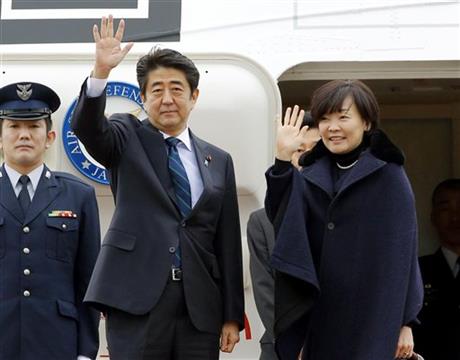
By KEN MORITSUGU
Japanese Prime Minister Shinzo Abe, center, and his wife Akie wave as they depart for Africa, at Haneda Airport in Tokyo Thursday, Jan. 9, 2014. Abe is heading to Africa, keeping up a busy overseas travel schedule designed to boost Japan’s global profile in the face of China’s rise. (AP Photo/Kyodo News) JAPAN OUT, MANDATORY CREDIT
Shinzo Abe, Akie Abe
Japanese Prime Minister Shinzo Abe, center, and his wife Akie wave as they depart for Africa, at Haneda Airport in Tokyo Thursday, Jan. 9, 2014. Abe is heading to Africa, keeping up a busy overseas travel schedule designed to boost Japan’s global profile in the face of China’s rise. (AP Photo/Kyodo News) JAPAN OUT, MANDATORY CREDIT
Prev 1 of 2 Next
TOKYO (AP) — Japan’s leader departed for a weeklong African tour Thursday, keeping up a busy travel schedule designed to restore Japan’s global influence in the face of China’s rise, as well as help Japanese companies win business overseas.
Prime Minister Shinzo Abe, who will make a short visit to the Mideast state of Oman before heading to the Ivory Coast, Mozambique and Ethiopia, is taking a different approach to foreign policy than his immediate predecessors, visiting a wider range of countries to try to broaden Japan’s diplomatic reach.
Publicly, Japanese officials deny that Abe’s travels have anything to do with China. “Wherever he goes, Prime Minister Abe is asked if he is there to compete against China, but that’s not our intention at all,” Hiroshige Seko, a deputy chief cabinet secretary, said in an interview Thursday. “As far as the African nations are concerned, they are important regardless of China.”
But the unofficial backdrop is China’s rise, and the relative decline of a once ascendant Japan during two decades of economic stagnation. Abe wants to restore confidence in Japan, both at home and abroad. He often gives speeches and high-profile media interviews when he travels, for example promoting his “Abenomics” growth policies to bankers in London and New York.
It’s partly about outflanking China, but also about gaining more global respect for Japan and renewing ties with natural allies in Southeast Asia, India and the Middle East, said Kent Calder, the director of the Reischauer Center for East Asian Studies at Johns Hopkins University.
A series of revolving-door prime ministers who served brief terms have hurt Japan’s diplomacy, and Seko said Abe feels responsible because it started with him during an earlier stint as leader in 2006-07. “What Prime Minister Abe is trying to do is to regain what Japan has lost over the past few years,” he said.
Abe touched down in 25 countries in 2013, his first year in office. He was the first Japanese leader to go to the Philippines since he visited in 2006, and made it a point to hit all 10 Southeast Asian countries. Other stops ranged from major Persian Gulf oil producers to Turkey, Poland and Mongolia.
Abe told reporters before his departure that Africa can be seen as “a frontier for Japan’s diplomacy.” Japan is a longtime aid donor to Africa, and it has stepped up its assistance over the past five years. In June, Japan hosted a meeting attended by nearly 40 heads-of-state of African nations, and pledged another $14 billion over the next five years, as well as promises of billions more in private investment.
Those efforts have been overshadowed by China’s imports of raw materials, massive infrastructure projects and exports of affordable consumer goods that are widely credited with helping lift African economies in the 21st century.
“When observers think of an Asian influence in Africa, nearly everyone speaks of China, not Japan,” said University of Utah political scientist Howard Lehman, editor of the book “Japan and Africa: Globalization and Foreign Aid in the 21st Century.”
Business executives will accompany Abe in Africa, with the biggest delegation of 29 companies going to Mozambique, a resource-rich country where Japanese companies are investing in coal and natural gas development.
Africa’s recent economic growth has also raised hopes that one of the world’s last major untapped markets is starting to realize its potential. Japanese officials paint the Ivory Coast, Abe’s first stop in Africa, as the gateway to a west African market of 300 million people.
Abe is likely to talk about Japan’s role in Africa when he gives a policy speech at his last stop in Ethiopia. The venue: The $200 million headquarters of the African Union that opened two years ago, paid for by China.
__
Associated Press writers Mari Yamaguchi and Elaine Kurtenbach contributed to this report.



